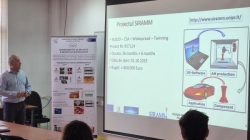The SIRAMM Project, Coordinated by Politehnica University Timișoara, a Success Story in the EU
The SIRAMM Project (Eastern European twinning on Structural Integrity and Reliability of Advanced Materials obtained through Additive Manufacturing), coordinated by Politehnica University Timișoara, has been recognized at the European level and featured in the "Success Stories" section on the website of the Directorate-General for Research and Innovation within the European Commission.
Politehnica University Timișoara is at the forefront of research in this new field of 3D printing, where it has thorough expertise, especially regarding the characterization and testing of components produced through additive manufacturing. The project, carried out from 2019 to 2023, with a total value of 800,000 euros, made a significant contribution by transferring knowledge from internationally renowned researchers in the field of additive manufacturing, integrity, and durability of structures to their younger colleagues starting their careers.
Additive manufacturing involves using 3D printing in industrial production, allowing the creation of complex components without joints and significantly reducing the need for post-processing.
However, even though this practice is widely used in the aerospace, biomedical, and automotive sectors, little is known about how manufacturing parameters influence the mechanical properties of the final 3D printed product.
The SIRAMM Project aimed to address this critical issue by involving academic partners from the Czech Republic, Italy, Norway, Romania, and Serbia. Together, the project partners set out to make their mark in additive manufacturing research while simultaneously strengthening their research capacity.
The five partners joined forces to enhance the quality and efficiency of 3D printing in industrial production. The cross-border cooperation within the SIRAMM project, funded by the EU, resulted in a large number of scientific papers and successfully transmitted vital skills to a new generation of researchers. These skills will contribute to producing more reliable and safer 3D printed products.
"We have successfully leveraged our collective experimental, theoretical, and numerical modeling expertise to address critical challenges in additive manufacturing. The project results provide valuable perspectives and improved knowledge, helping European countries produce more reliable and safer 3D printed products," explained Prof. Liviu Marșavina, Ph.D., Vice-Rector for Research at Politehnica University Timișoara and coordinator of SIRAMM.
Overall, the project led to the publication of 53 scientific papers and had a significant impact in terms of citation numbers. One of them, published in "Engineering Fracture Mechanics," became the most downloaded paper in the journal of all time.
Knowledge transfer activities were also a success. The three winter schools organized in Timișoara in 2021, Brno in 2022, and Belgrade in 2023 had over 500 participants from five continents, mostly master's and doctoral students. The three workshops in Timișoara 2021, Brno 2022, and Belgrade 2022 had over 300 participants, and the two conferences in Belgrade 2021 and Timișoara 2023 had over 350 attendees. Within the project, 22 weeks of mobility for researchers and 38 months of mobility for doctoral students were realized.
The project was completed in 2023, but its impact continues through the implementation of a course on "Theory and Applications of Additive Manufacturing" at Politehnica University Timișoara. This course is the first of its kind in a Romanian university and has successfully attracted a large number of students, demonstrating a growing interest in additive manufacturing. Following this project, similar courses have been offered at other partner institutions, including the University of Belgrade in Serbia.
The SIRAMM team intends to expand its research on predicting the integrity and durability of components made through additive manufacturing. An essential objective is to integrate advanced methods, such as artificial intelligence, for reverse engineering problems, contributing to streamlining production procedures, saving resources, and increasing the safety level of printed parts.














